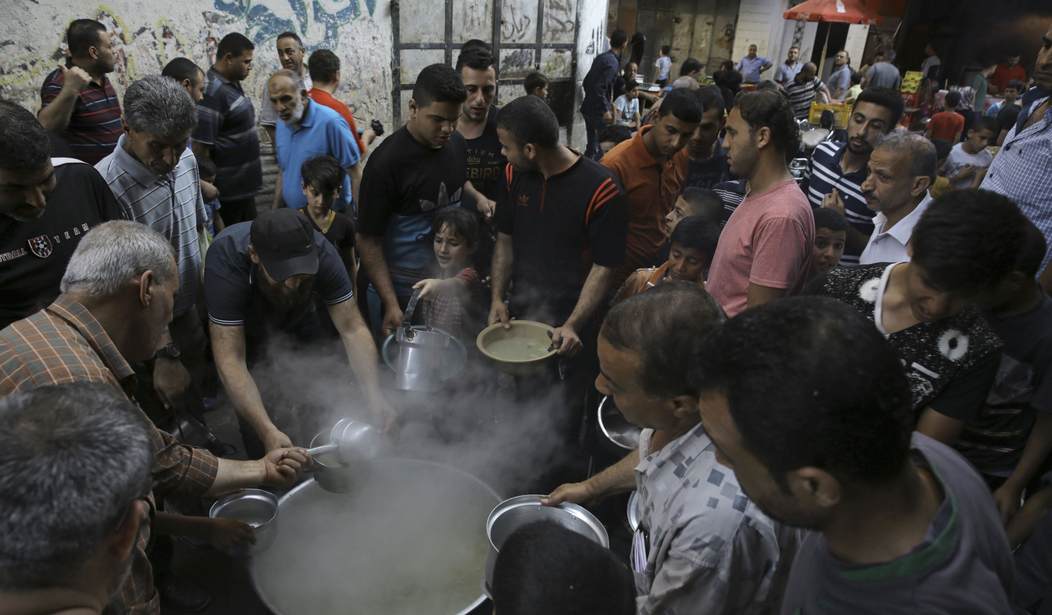Despite Israel being fully entitled to defend itself and pursue its effort to wipe out Hamas, there is no arguing that the situation in the Gaza Strip has reached the point of being a humanitarian crisis for the civilians living there. It's true that the vast majority of them almost certainly supported Hamas and hate Israel, but if nothing else, the conditions the Gazans are existing under have turned into a public relations nightmare for Netanyahu. Yes, bad things happen in war, but with the White House now demanding more equitable treatment of Gaza's residents, something needs to be done. Joe Biden has determined that part of the "something" in question will be U.S. airdrops of aid into the Strip and that's not an unreasonable approach at this point. But how this relief will be handled will be critical. (Associated Press)
Biden said the airdrops will be coordinated with Jordan, which has conducted several rounds of airdrops into Gaza in recent months and will begin in the “coming days.” The first deliveries are expected to be pallets of food -– military rations known as MREs — with other assistance potentially to follow. National Security Council spokesman John Kirby didn’t offer a more exact timetable for the airdrops but said the first round would not be the last.
The Biden decision comes after at least 115 Palestinians were killed and more than 750 others were injured on Thursday trying to access aid in northern Gaza under disputed circumstances, according to Gaza’s Hamas-run health ministry. Witnesses said Israeli troops opened fire as huge crowds raced to pull goods off an aid convoy, while Israel has said it fired only when its troops felt threatened and that most of the civilian casualties were from trampling.
The need for new ways to handle relief delivery was highlighted when a significant number of Gazans were killed or injured while swarming a truckload of aid in the northern part of the Strip this week. Israel investigated and insisted that the IDF only opened fire when they felt threatened and that most of the casualties were caused by trampling. But it was still a complete mess and the media had a field day proclaiming the Israelis to be murderous monsters.
A series of airdrops could provide a number of strategic advantages. The initial deliveries are reported to be military MREs (Meals Ready to Eat) and water. More varied items could and probably should be added for later drops. These could include other food products that don't require complicated cooking and basic medical supplies. Baby products and feminine hygiene products should probably also be included for mothers in the Strip.
The first and most important consideration is that these drops should be coordinated with Israel in advance. Any time aid shows up, it's going to attract a mob of people. When it comes in the form of a line of trucks, that mob will be huge and potentially deadly as we saw this week. Israel should be warned in advance so that the IDF can pull back from the anticipated drop points. Let the Gazans sort it out for themselves. But the crowds will be smaller if smaller amounts of aid are dropped nearly simultaneously at many points across the region. That should help minimize the collateral damage.
This could prove to be a public relations win for both the White House and Netanyahu, not to mention the people living in Gaza. Meanwhile, the IDF can keep up its routine of searching out the remaining Hamas terrorists and either killing or capturing them as they go. They just found a pack of them hiding in a school this week. Yes, Hamas uses schools and hospitals as fronts filled with human shields for their fighters, no matter what you may have heard from the mainstream media.
The airdrops are only a temporary solution, unfortunately. The question of what the future of the Gaza Strip looks like once Hamas is vanquished will still have to be answered. Israel's stated intentions thus far are being roundly criticized, but as we've discussed here before, there are no clear, obvious solutions available that offer much promise. In the end, the people of Gaza hold their own fate in their hands to a certain extent. If they can make peace with the idea of living nonviolently as Israel's neighbors, perhaps they can build a functional society with a civilian government of their own. If they can't, we'll have too do this all over again in the future.









Join the conversation as a VIP Member